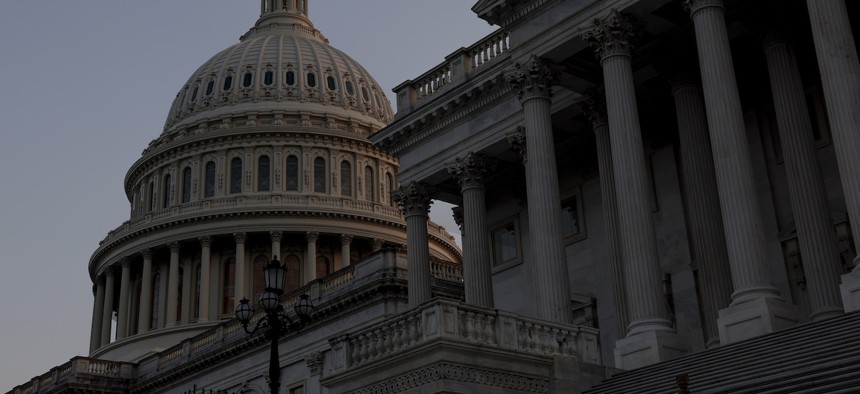
The U.S. Capitol Building on June 1, 2023. Anna Moneymaker/Getty Images
Senate Passes Debt Deal, Agency Spending Freeze Bill Headed to Biden's Desk
Bipartisan leaders pledge to pass fiscal 2024 funding bills to avoid a sequestration next year.
The Senate late Thursday evening passed a bill to ensure the government continues to pay its bills on time, sending to President Biden’s desk a measure that will freeze spending at most federal agencies next fiscal year but remove the threat of delayed paychecks for employees.
The bill won bipartisan support, just as it did on Wednesday in the House. The measure, which came together after weeks of tense negotiations between the White House and House Republicans, will suspend the debt ceiling through Jan. 1, 2025, punting the next default crisis until after the next presidential election. The Senate approved the 2023 Fiscal Responsibility Act by a 63-36 vote.
The Senate faced a June 5 deadline to avoid the first default in U.S. history, which was put into jeopardy when several lawmakers threatened to upend a hastened voting process unless their preferred amendments received votes. Senate Majority Leader Chuck Schumer, D-N.Y., was reluctant to grant those requests, noting that any amendment to the bill would likely force Congress to miss its deadline to avoid default. He and Republican leadership ultimately agreed to consider 11 amendments, all of which failed.
The budget agreement, while avoiding the more drastic cuts Republicans had sought and the Biden administration had warned would force agencies to furlough employees, will allow for discretionary spending at non-defense agencies to remain essentially flat in fiscal 2024. The bill carves out the departments of Defense and Veterans Affairs, where funding will meet President Biden’s request. It will cap spending at 1% growth for fiscal 2025 for both defense and non-defense agencies.
To avoid deeper cuts, the measure rescinds some not-yet-spent funding provided for COVID-19 relief and claws back some of the $80 billion cash infusion Congress provided to the Internal Revenue Service as part of the Inflation Reduction Act. The bill specifically spells out $1.4 billion in rescissions, but White House officials told reporters there is an additional agreement to rescind another $10 billion in both fiscal years 2024 and 2025. The reduction is not expected to change any immediate plans for IRS, which is looking to hire 30,000 employees over the next two years to boost enforcement and customer service, as the agency could spend the remaining $60 billion in Inflation Reduction Act funds whenever it sees fit. White House officials said the provision does not “fundamentally change” IRS’ short and medium-term plans, but will require additional cash for the agency several years down the line.
The deal also seeks to limit the threat of a shutdown for the next two years. If by Jan. 1, 2024, Congress has not passed all 12 annual appropriations bills, a continuing resolution would kick in that cuts discretionary spending for defense and non-defense agencies by 1% until such bills are passed. The provision is intended to incentivize lawmakers to pass line-by-line funding bills, as both Democrats and Republicans want to avoid a cut to their key priorities. The same contingency would be in effect for 2025.
Current funding is set to expire Sept. 30, meaning a fall shutdown could still occur.
Ahead of Thursday’s vote, some senators voiced concern that Congress would settle for the so-called “99% CR”—which would lead to a sequestration of funds provided above that level since Oct. 1, 2023—and threatened to delay any votes unless they received certain assurances. In response, Schumer and Senate Minority Leader Mitch McConnell, R-Ky., issued a joint statement saying the Senate Appropriations Committee would quickly start working toward writing fiscal 2024 funding bills.
"The leaders look forward to bills being reported out of committee with strong bipartisan support,” Schumer and McConnell said. “The leaders will seek and facilitate floor consideration of these bills with the cooperation of senators of both parties.”
The bill includes a requirement for the Biden administration to offset the cost of regulatory rules it implements, but allows the Office of Management and Budget to easily ignore it. The measure also makes some reforms to the National Environmental Policy Act to hasten the federal permitting process for energy projects.
The agreement drew criticism from both the most progressive and conservative members of Congress. On the right, lawmakers said the spending freeze, as well as the changes to extend work requirements for the Temporary Assistance for Needy Families and Supplemental Nutrition Assistance Program, were insufficient. On the left, members noted the fiscal 2024 non-defense spending freeze and small increase in 2025 represented an effective cut in real dollars when accounting for inflation. The deal falls well short of the 7.3% increase to non-defense discretionary spending Biden had sought and eschews the parity in funding increases for the defense and non-defense sides of the ledger that Democrats typically demand.
Biden had implored lawmakers to quickly get the bill to his desk and has vowed to sign it into law. If a default had occurred, the Treasury Department would have been unable to make all the payments that federal agencies owe and government operations would have been upended. That would have caused federal employees to face delayed paychecks.







